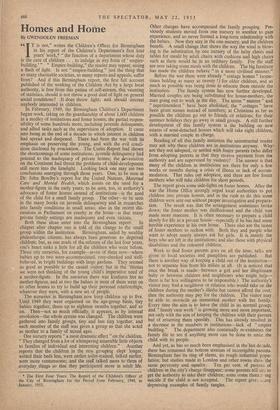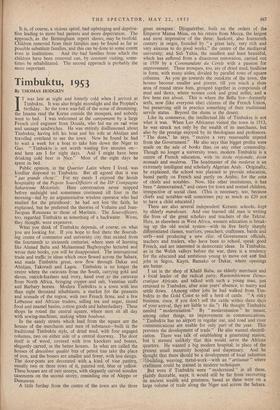Homes and Hothe
By GWENDOLEN FREEMAN I 46 T is not," writes the Children's Officer for Birmingham in his report of the Children's Department's first four years' work,* " the function of a department whose duty is the care of children . . . to indulge in any form of ' empire- building.' " " Empire-building," the reader may repeat, seeing a flash of light. Is not " empire-building " just the thing that so many charitable societies, so many reports and appeals, suffer from? And if this Birmingham report, the first full account published of the working of the Children Act by a large local authority, is free from this patina of self-esteem, this vaunting of statistics, should it not throw a good deal of light on general social conditions? It does throw light; and should interest anybody interested in children.
In February, 1949, the Birmingham Children's Department began work, taking on the guardianship of about 1,600 children in a medley of institutions and foster homes, the partial respon- sibility of some hundreds more, including juvenile delinquents, and allied tasks such as the supervision of adoption. It came into being at the end of a decade in which interest in children had spread and deepened. There had been the war with its emphasis on preserving the young, and with the evil condi- tions disclosed by evacuation. The Curtis Report had shown the shortcomings of some institutions; juvenile delinquency had pointed to the inadequacy of private homes; the devastation on the Continent had thrust the problems of child-development still more into the limelight. Looking back one may see two conclusions emerging through those years. One, to be seen in Dr. John Bowlby's report for the United Nations, Maternal Care and Mental Health, which insists on the need for a mother-figure in the early years; to be seen, too, in authority's advocacy of foster homes instead of institutions—is the need of the child for a small family group. The other—to be seen in the many books on juvenile delinquency and in researches into family conditions in small areas; also in the recent dis- cussions in Parliament on cruelty in the home—is that many private family settings are inadequate and even vicious.
Both these ideas enter into the Birmingham report. In chapter after chapter one is told of the change to the small group within the institution. Birmingham, aided by wealthy philanthropic citizens. has always been generous to deprived children; but, as one reads of the, reforms of the last four years, one's heart sinks a little for all the children who went before. Those city nurseries, for example—seven of them now—where babies up to two were accommodated, rosy-checked and well- behaved, in bright buildings with large gardens. They seemed as good as possible to the casual visitor; but in the 'thirties we were not -thinking of the young child's imperative need of a mother-figure. In the nurseries there was kindness but no mother-figures, and at two the babies in most of them went on to other homes to try to build up their personal relationships, whatever they were, with a new set of people.
The nurseries in Birmingham now keep children up to five. Until 1949 they were organised on the age-group basis, tiny babies together, those up to eighteen months together, and so on. Then—not so much officially, it appears, as by internal revolution—the whole system was changed. The children were gathered into family groups, tiny and less tiny together, and each member of the staff was given a group so that she acted as mother to a family of mixed ages.
One nursery reports " a most dramatic effect " on the children. " They changed from a lot of whimpering miserable little objects to families of individual and interesting children." Another reports that the children in the new grouping slept longer, wetted their beds less, were earlier toilet-trained, talked earlier, were more venturesome; and the staff talked more to them of everyday things so that they participated more in adult life.
* The First Four Years: The Report of the Children's Officer of the City of Birmingham for the Period from February, 1949, to January, 1953.
Other changes have accompanied the family grouping. Pre- viously students moved from one nursery to another to gain experience, and so never formed a long-term relationship with the babies. Now they stay in the one nursery, and the children benefit. A small change that shows the way the wind is blow- ing is the substitution by one nursery of the baby chairs and tables for meals by adult chairs with cushions and high chairs such as there would be in an ordinary family. For the staff are now taking some meals with the children. The big furniture has made the children behave " in a more civilised manner."
Before the war there were already " cottage homes " (some- times holding as many as twenty I) for older children, and as much as possible was being done to educate them outside the institution. The family system has now further developed. Married couples are being substituted for house-mothers, the man going out to work in the day. The terms " matron " and " superintendent " have been abolished; the " cottages " have been given names instead of numbers; at Christmas as far as possible the children go out to friends or relatives; for their summer holidays they go away in small groups. A still further development of this family system is the building on new estates of semi-detached houses which will take eight children, with a married couple in charge.
Reading of all this family imitation the uninstructed reader may ask why these children are in institutions anyway. Why are they not adopted, or settled with foster parents (who differ from adopting parents in that they receive payment from the authority and are supervised by visitors)? The answer is that many of the children in institutions are there for only a few weeks or months during a crisis of illness or lack of accom- modation. That rules out adoption, and there are few foster mothers who will take children for short periods.
The report gives some side-lights on foster homes. After the war the Home Office strongly urged local authorities to put children into private homes, and in the rush to do this some children were sent out without proper investigation and prepara- tion. The result was that the arrangement sometimes broke down; the foster mother was disillusioned and the child was made more insecure. It is often necessary to prepare a child slowly for life in a private house—especially if he has had some terrible experience in his own home. There also are the tastes of foster mothers to reckon with. Both they and people who want to adopt nearly always ask for girls. It is mainly the boys who are left in the institutions; and also those with physical disabilities and the coloured children.
Work to find foster parents goes on all the time; talks are given to local societies and pamphlets are published. But there is another way of keeping a child out of the institution— not to separate him from his milieu at all. (It is noticed that once the break is made—between a girl and her illegitimate , baby or between children and neighbours who might help— there is far less willingness to be responsible.) The authority's visitor may find a neighbour or relation who would take on the children during the mother's illness but cannot afford the cost; then the authority may pay for the children. The visitor may be able to reconcile an unmarried mother with her family. Every time the aim is to leave the child in its normal group; and " family' case work " is growing more and more important, not only with the aim of keeping the children with their parents but of returning them speedily. This has already resulted in a decrease in the numbers in institutions—lack of " empire building." The department also continually re-examines the family file to see if anything more can be done to unite the child with its people.
And yet, as has so much been emphasised in the'last decade, there has remained the bottom stratum of incorrigible parents. Birmingham has its ring of slums, its rough industrial popu- lation; but studies made in London and other towns silo the same perversity and squalor. Ten per cent. of parents of children. in the city's charge disappear; some parents tell Jic, to get the authority to take their children; some come threa.:. ing suicide if the child is not accepted. The report give; —Any depressing examples of family tangles. It is, of course, a vicious spiral, bad upbringing and depriva- tion leading to more-bad parents and more deprivation. The approach, as the Birmingham report shows, may be twofold. Children removed from their families may be found as far as possible substitute families, and this can be done to some extent even in institutions. And the bad families from which the children have been removed can, by constant visiting, some- times be rehabilitated. The second approach is probably the more important.



































 Previous page
Previous page